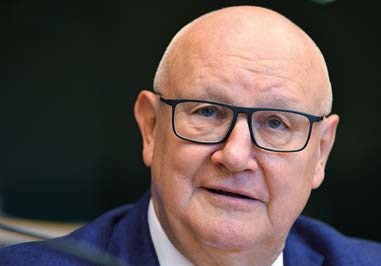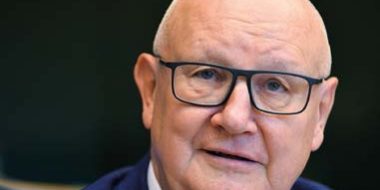by Ioan Mircea Pașcu, Vice-President, European Parliament, Brussels /Strasbourg
The deterioration of the security situation around Europe has accompanied the international financial and economic crisis of 2008. The EU has become inward looking, being gradually absorbed by internal problems (the sovereign debt, the euro etc.) The result has been the neglect of the conflicts around us and of their potential for spilling over into our house. And, indeed, terrorist attacks and the refugee crisis soon followed. This situation has inevitably increased the public’s awareness,who has become very concerned and demanded that European leaders focus their attention on security and defence, an area that was largely depleted of resources until then.
Paradigm change
Consequently, the EU has responded to these calls from both the public and industry and started to pay proper attention: the December 2013 EU Council, the adoption of the Global Strategy and the Bratislava summit (both in 2016) launched – in rapid succession – the Preparatory Action on Defence Research (PARD), the European Defence Industrial Development Programme (EDIDP) and the European Defence Fund (EDF). A new paradigm – spending EU common money for security and defence, a national remit of the Member States – has been thus initiated, without, of course, replacing national efforts, which it only accompanies. In fact, the idea was to spark cooperation
between the defence industries of the Member States by incentivising common projects, an effort meant to accompany the successful activation of the Permanent Structured Cooperation (PESCO) clause in the Lisbon Treaty at the state level (25 states and 34 projects). However, for reasons of expediency, the entire effort has inevitably been marked by improvisation, located mainly in the remit of industry (Growth, Investment and Competitiveness/Internal Market, Industry, Entrepreneurship and Small and Medium Enterprises), since there was no specified place for defence.
For that reason, the European Parliament had to improvise too, by entrusting the mission of monitoring the spending of common money through these initiatives to the ITRE Committee, with the Foreign Affairs Committee and the Security and Defence Sub-Committee simply offering their opinion.
New geopolitical situation
One should not ignore that, apart from the crises and conflicts on our continent, terrorism and the refugee crisis, the statements during the last US Presidential elections questioning the very core of NATO – the activation of Article V, and thus the validity of the Alliance as such – were followed by a shift in emphasis within the transatlantic relationship from political and military cooperation to economic and commercial competition. This has played a role too. With the US increasing its focus on competition with China, one can wonder what is the relevance of NATO for the US in this context and whether the Alliance will not come to be seen as a
distraction and a waste of resources otherwise needed for the competition with China. Of course, Russia’s aggressiveness and the weight of transatlantic relations within the international system remain pillars in preserving NATO’s value to any American administration, including the present one, determining the EU to fully cooperate with the Alliance.
However, the recent withdrawal of the INF Treaty – a cornerstone in the absence of the nuclear arms race in Europe since 1987 – has placed the continent in a vulnerable position in that respect again, adding to the other security concerns.
Moreover, the proximity of Africa as a source of negative developments, an area where, for historical reasons among others, the US is not as interested, makes Europe and primarily the EU the main actor when it comes to conflict prevention and crisis management, a role we should be prepared to exercise mostly alone…
Creating a new Directorate General
For all these reasons, the time has come to centralise security and defence efforts at the level of the Commission by establishing an separate General Directorate with a proper Commissioner in charge. That would bring together all the existing institutional arrangements under one budget, avoiding both duplication and inevitable bureaucratic turf wars.
Naturally, DG Defence would inevitably have to cooperate with the other DGs, primarily industry, research and development, and space, and be in close contact with the office of the HR/VP for political guidance. The future relationship with the Member State level – PESCO – would inevitably have to go through the EDA, a body that has accumulated an invaluable expertise in the field of defence cooperation.
A proper EP committee on security and defence
On the side of the European Parliament, defence and security will have to come to their proper locus, namely the Foreign Affairs Committee and the Security and Defence Sub-Committee, which would inevitably become in time a proper Committee in its own sense.
And, to conclude, as the EU security and defence effort could not substitute the national efforts of the Member States according to the Treaties, although it might appear paradoxical, the more EU common money is spent in these fields, the more the EP would have to cooperate with national Parliaments, ensuring the efficacy and effciency of the entire EU effort in this respect.

photo: European Union, source EP
Dr Ioan Mircea Paşcu MEP
is Vice-President of the European Parliament. He is member of the Foreign Affairs Committee and the Subcommittee on Security & Defence. He is also CSDP coordinator for the S&D Groupe in the European Parliament. Born in 1949 in Satu Mare, Romania, he obtained a Ph.D. in Political Science from the Institute of Political Science in Bucharest in 1980. From 1990 to 1992, Mr Pascu was presidential councilor and afterwards became State Secretary in the Ministry of Defence in Bucharest (1993). He then became Member
of Parliament in 1996 and Minister of Defence in 2004. In 2007 he joined the EP as a member of the Social Democratic Party (PSD).







